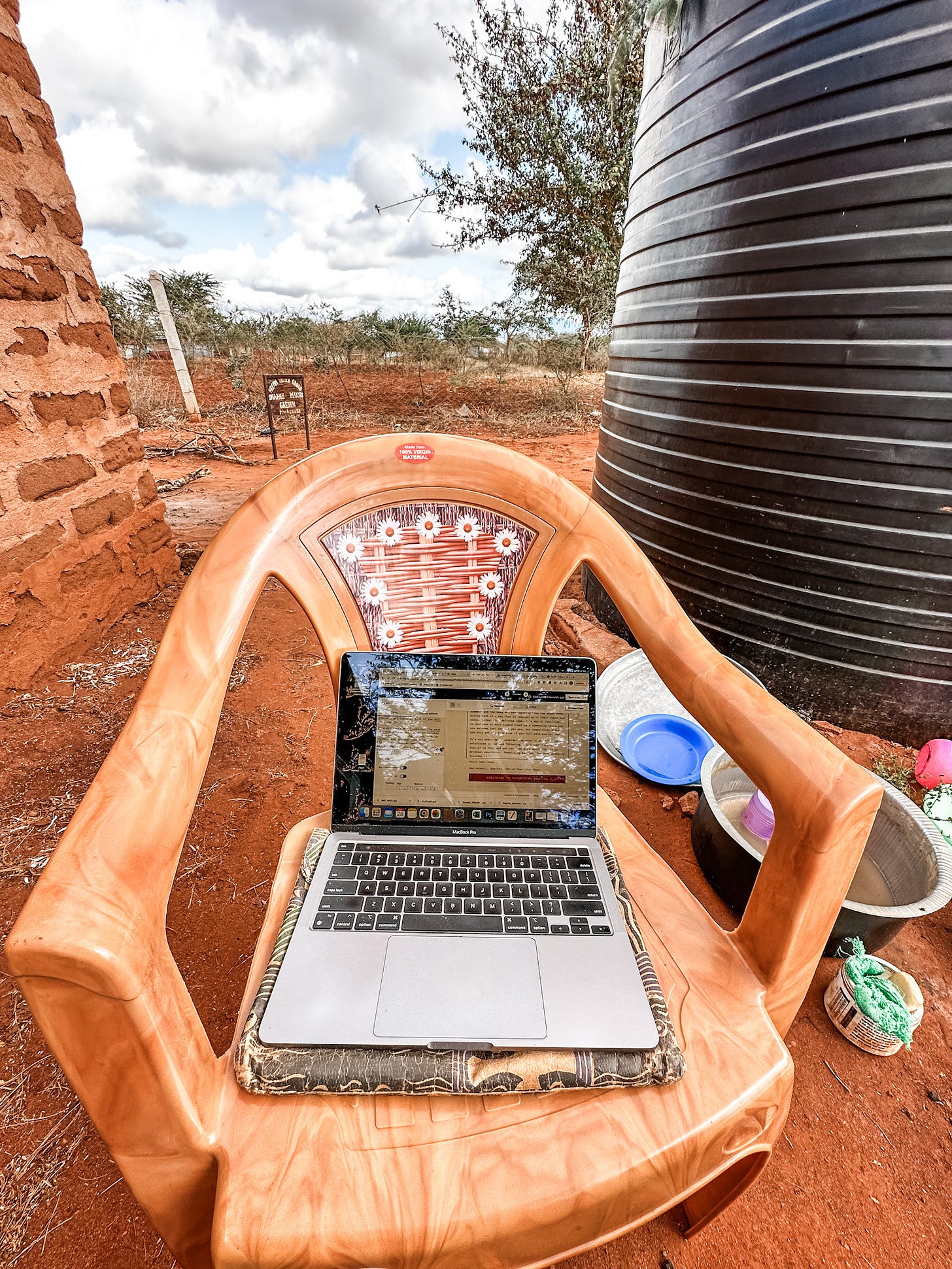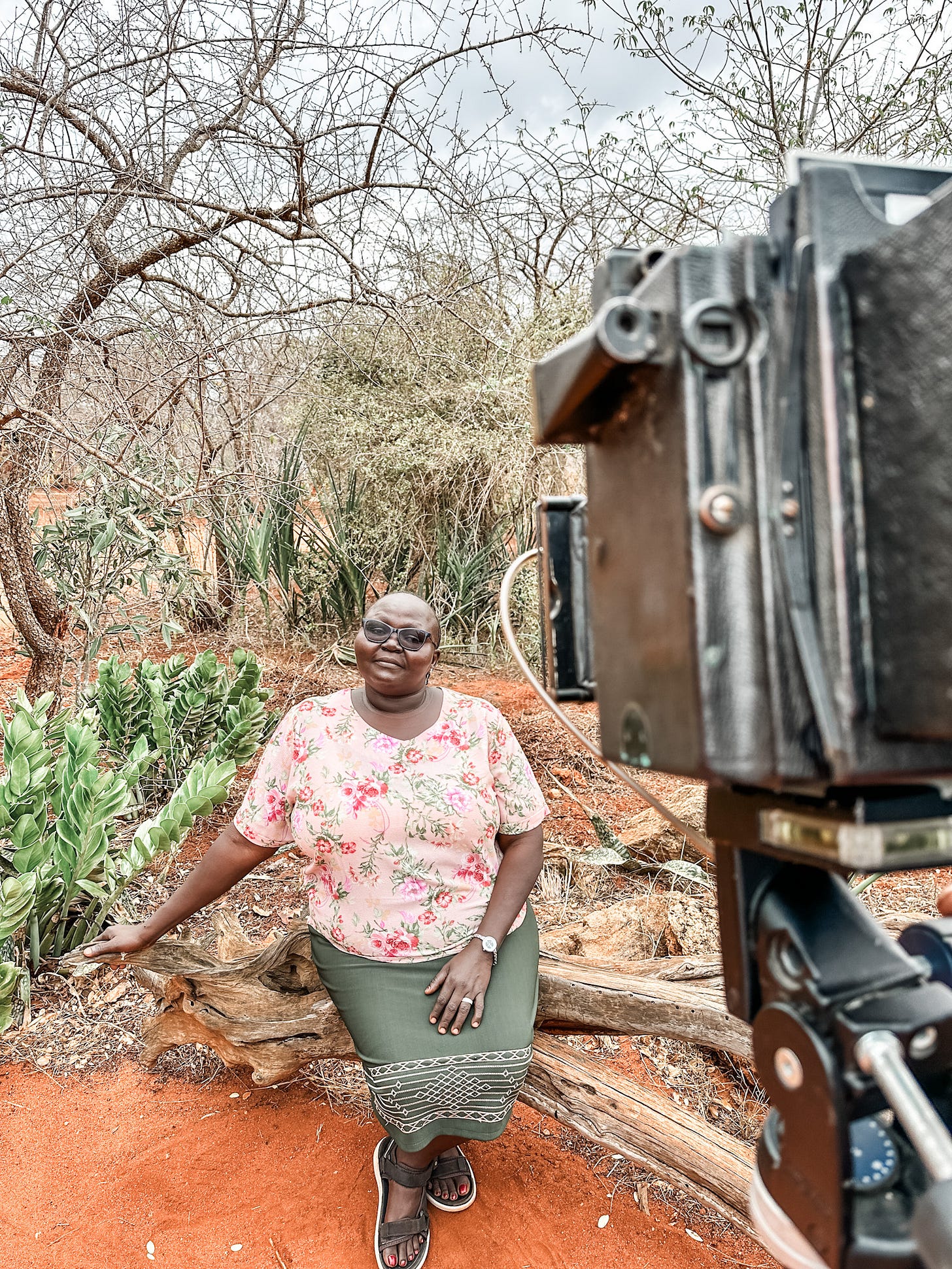It's a dog and pony show
The myths privileged Westerners make about African women and how they've got our number
Every few weeks or so, I’ll be publishing a longer format post that integrates my experiences with travel, business, and life with theory from my academic research. No one knows how I still remember this stuff, as I can barely recall yesterday, but I am quite pleased to be digging into my research again after all these years (and more than $100K in student loan debt from a PhD I never finished so…).
Today I’m reflecting on myths privileged Westerners make about African women and how they have our number.
This week I’m setting up shop to write outside of the Neema’s Women Group. They are one of the hundreds of women’s groups who receives loans from Zawadisha. Two of the members of this group are employed as our Peer Educators, and Monica, our COO, is their Treasurer.
My work in Kenya is complicated. I’m not referring to the day-to-day work (we’ve been chipping away at those challenges for more than a decade, which is too much to get into here now, but I will another time). What I’m referring to is the narrative that is created around me and them.
Here’s the story that’s told about me (insert eye roll here): I’m an intrepid entrepreneur, fearless, bold, and big-hearted in helping financially poor, uneducated Kenyan women pull themselves up by their bootstraps. They are now able to help themselves through our lending program, rather than depend on aid (gasp!). No one would dare say it out loud, but I’m the white woman rescuing African women from African men and with that comes a do-gooder badge of honor.
I am keenly aware of how I am automatically rendered more advanced based on my position in this world; I have the ability to shape the social, cultural, economic, and political development of other women based on their locale, particularly if they are from the global South. Existing within this reality is rather simple; challenging it is difficult.
In the United States, we have such a distaste for the poor; we believe they are poor because of bad decisions, laziness, and plain stupidity. When we consider the poverty that Africans face, it’s because of corruption, lack of education, refusal to adopt modern systems, and oppressive societal norms (the latter is the rationale for protecting African women from African men). Regardless of the location, the way that people living in poverty are perceived has far less to do with them and far more to do with maintaining the interests of the privileged.
Here’s the story written about them: One not need to ever travel to one of the 54 countries in Africa or have an actual conversation with a human being on that continent. The trope of the African woman is nearly impenetrable. Proof is in this excerpt from an article written many years ago about one of the first women to receive a micro-loan from Zawadisha (the social enterprise that I founded more than ten years ago):
“Barey's eyes widened with wonder as she held the piece of paper in her hand. She struggled to decipher the words on the document but understood its significance — the number, 5,000 Kenyan shillings, would be paid to her to start her own small business baking and selling chapati to support her family. As a child Barey never had a chance to learn to read or write or learn anything else for that matter besides street smarts and the necessity of hard work. But now, as a 41-year-old widow, she had earned an opportunity to break free of the vicious cycle of living hand-to-mouth, day after day.”
By stripping Barey of her agency, she is not responsible for her poverty. Therefore she is worthy of our support (unlike Black women in the United States who are poor due to their immorality and laziness and general inability to attain the American Dream… insert eye roll again). It fits neatly into the corporatization of US culture and naturalization of capitalist values that are now taken for granted and so normalized in the US that we’ve seamlessly exported them abroad.
bell hooks so deftly describes the problem:
“No need to hear your voice when I can talk about you better than you can speak about yourself. no [sic] need to hear your voice. only [sic] tell me about your pain. I want to know your story. And then tell it back to you in a new way. Tell it back to you in such a way that is has become mine, my own. Re-writing you, I write myself anew. I am still author, authority. I am still the colonizer, the speaking subject, and you are now at the center of my talk.”
This is where it gets complicated. It is my job as the founder and Board President to raise money for Zawadisha. It’s how we fund our Peer Educator program, which has created jobs for more than five women. It’s how we offer workshops on kitchen gardens and permaculture, facilitated by our Peer Educators, that reduce food insecurity. It’s how we fund the capital needed to deliver solar lamps, clean cookstoves, and rainwater tanks to the homes of women.
While I am so proud of our work at Zawadisha and stand behind what we do, I know that free-market solutions, packed neatly into the extensions of small loans, will only go so far to positively impact women’s lives because it ignores the complexity of the issues surrounding poverty in the global South.
Yet I must create meaning for people who have little understanding of the complexity of the issues we are dealing with, and this requires a simplified explanation of the problem and solution. Competition for funds is fierce and you often struggle between telling the story you know is true (which absolutely annoys the F out of people, particularly when you sprinkle in a few words about white men and white women and the role they play in upholding colonizer and capitalistic values) and telling a story that others want to hear. Telling the latter results in money in the bank that you then send to Monica because she’s been asking for it and I must deliver.
“These stories make inspiring reading primarily because of the worthwhile nature of the mission, the seemingly heroic actions and capabilities of the founders, and the tension and then resolution inherent in the dynamics of the narratives. In sum, these stories are packaged as heroic quests in which the entrepreneurs are seen as overcoming one obstacle after another on the way to their Quixotic objectives.” ~ Goldstein, Hazy, and Silberstang
Tell me you’d say no to this woman when she tells you it’s time to send funds for more loans or training in the community. I’m no longer afraid to ask people for money, and I’ve learned after 20 years on this continent how to do it in a way that honors both Monica and the women we work with because I know how important it is to the sustainability of our work.
Friends, I’m no hero. I don’t know anything that these women here don’t already know. I simply have the power, privilege, and resources to help improve the daily lives of women here. So that’s what I do. It’s taken me nearly 20 years to figure it out, and I’m still learning. I challenge myself every day to tell a story that isn’t the one that you want to hear, but rather one that reflects the truth. And that means undoing hundreds of years of conditioning.
Women like Barey learned at a young age that it literally pays to fit into the box built for them by Westerners, particularly white women. Theory doesn’t always play out so seamlessly IRL and sometimes you need to eat, pay school fees, and tend to medical expenses. Barey (and I) know that to obtain resources (financial and social) there is a game to be played. You say what other people want to hear, and for African women it’s a simple message (that is so deep that it needs its own post to unpack): Because of your loan, donation, gift, or grant, I am now empowered.
What she has learned through the course of her lifetime engaging with missionaries, adventure seekers, non-profit workers, and feminists is that her most immediate interests are served by maintaining the status quo. If her narrative were to change, if she no longer was the woman with “nothing” whose life was changed by the women with “everything,” she would destroy the construct of the devalued Other. The money could potentially stop flowing as she strips purpose and meaning away from the hand that feeds her. The risks are far too great for her to engage in a theoretical battle so she says what we want to hear and pockets her well-deserved and hard-earned cash.
As the principal executive in Zawadisha who is responsible for engaging with donors, volunteers, board members, and supporters, I’ve seen how when you deviate from the narrative of the Other, the pen runs out of ink. I have been in front of service groups, community foundations, individual donors, and random humans at the bar whose eyes glaze over when you embark on a real discussion in which you do not paint these women as infantile, who are only capable of helping themselves once they have been rescued by those of us who hold the key to their futures.
These women are not naive, not waiting to be saved. They’ve become masters at the dog and pony show that Westerns created. And they’re taking home the gold.
Very smart people who created the theory that supported my thoughts:
hooks, b. (2010). Yearning: Race gender and cultural politics. In M. Eagleton (Ed.), (pp. 241). Malden, MA: Wiley-Blackwell.
Goldstein, J. A., Hazy, J. K., & Silberstang, J. (2008). Complexity and social entrepreneurship: a fortuitous meeting. Emergence: Complexity and Organization, 10(3), 9-24.
Naghibi, N. (2007). Rethinking global sisterhood: western feminism and Iran. U of Minnesota Press.
Spivak, G. C. (1988). Can the subaltern speak? In Marxism and the interpretation of culture. Nelson, C. & Grossberg, L eds. Chicago: University of Illinois Press, 1988: 271-313.








